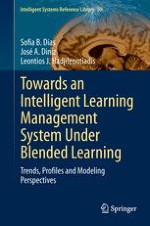
2014 | OriginalPaper | Chapter
2. Coresponsibility on Negotiation Process and Issues in Blended Instruction
Authors : Sofia B. Dias, José A. Diniz, Leontios J. Hadjileontiadis
Published in: Towards an Intelligent Learning Management System Under Blended Learning
Publisher: Springer International Publishing
Activate our intelligent search to find suitable subject content or patents.
Select sections of text to find matching patents with Artificial Intelligence. powered by
Select sections of text to find additional relevant content using AI-assisted search. powered by